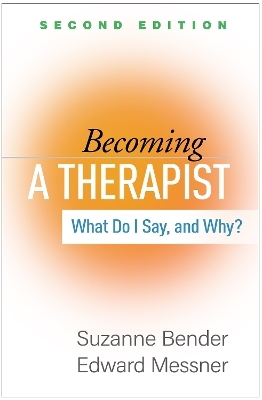
Becoming a Therapist, Second Edition
Guilford Press (Verlag)
978-1-4625-4946-7 (ISBN)
New to This Edition
*Reflects two decades of technological changes--covers how to develop email and texting policies, navigate social media, use electronic medical records, and optimize teletherapy.
*New chapters on professional development and on managing the impact of therapist life events (pregnancy and parental leave, vacations, medical issues).
*Instructive discussion of systemic racism, cultural humility, and implicit bias.
*Significantly revised chapter on substance use disorders, with a focus on motivational interviewing techniques.
*Reproducible/downloadable Therapist Tools.
See also other essential resources for new clinicians--The Mental Health Clinician's Workbook, by James Morrison, which takes a learn-by-doing approach to building diagnostic skills, and The Therapist's Journey, by Robert Taibbi, which offers guidance for navigating professional development, boundaries, self-care, and more.
Suzanne Bender, MD, is a Staff Psychiatrist in the Division of Child and Adolescent Psychiatry at Massachusetts General Hospital (MGH) and Assistant Professor in Psychiatry, part-time, at Harvard Medical School. Within the Department of Pediatric Gastroenterology (GI) and Nutrition Department at MGH for Children (MGHfC), she is the Co-Director of the MGHfC Pediatric GI Psychiatry program. Dr. Bender teaches a weekly year-long course on child and adolescent psychodynamic psychotherapy in the MGH/McLean Child and Adolescent Psychiatry Fellowship Program. She has received five departmental teaching awards and three departmental mentoring awards from the graduating classes of the Child Psychiatry Fellowship. Dr. Bender has a private practice in Newton, Massachusetts, specializing in psychotherapy and psychopharmacology with children, adolescents, and adults. Edward Messner, MD, until his death in 2006, was a Senior Psychiatrist at Massachusetts General Hospital (MGH) and Associate Clinical Professor of Psychiatry at Harvard Medical School. Dr. Messner trained as a psychiatrist at the Boston VA Hospital, at Boston’s Thom Clinic, and at MGH. He also graduated from the Boston Psychoanalytic Institute as a certified psychoanalyst. Dr. Messner received the Teacher of the Year award from the MGH Department of Psychiatry eight times. To honor him and his qualities of “kindness, compassion, understanding, insightfulness, humility, and selflessness in his daily work with patients and as an untiring teacher and supervisor of residents,” the MGH/McLean Adult Psychiatry Residency created the Edward Messner Faculty and Resident Awards in 2008. These awards annually recognize outstanding and committed teaching in Adult Psychiatry by both a faculty member and a graduating resident.
Foreword,Nhi-Ha Trinh
Introduction
I. The Consultation
1. First Contact
2. The First Moments
3. Initiating an Alliance and Assessing Safety
4. Enhancing the Therapeutic Alliance and Eliciting History
5. Collecting a Psychosocial History and Screening for Common Psychological Disorders
6. Creating a Formulation and a Treatment Plan
II. Frame and Variations
7. The Frame
8. Setting the Fee and Billing
9. Telephone Calls and Emails: From Dependencies to Emergencies
10. No-Shows, Late Arrivals, and Late Departures
11. When the Therapist’s Life Affects the Frame: Vacations, Pregnancies, and Illness
12. Confidentiality and Its Limits
III. Chemistry
13. Substance Use Disorders
14. Integrating Psychopharmacology with Psychotherapy
IV. Therapeutic Dilemmas
15. Managing Impasses
16. Empathic Lapses
17. Transference and Countertransference
18. Termination
V. Being a Therapist
19. Professional Development
Glossary
Additional Readings
References
Index
| Erscheinungsdatum | 11.04.2022 |
|---|---|
| Verlagsort | New York |
| Sprache | englisch |
| Maße | 152 x 229 mm |
| Gewicht | 660 g |
| Themenwelt | Geisteswissenschaften ► Psychologie ► Psychoanalyse / Tiefenpsychologie |
| Medizin / Pharmazie ► Medizinische Fachgebiete ► Psychiatrie / Psychotherapie | |
| ISBN-10 | 1-4625-4946-2 / 1462549462 |
| ISBN-13 | 978-1-4625-4946-7 / 9781462549467 |
| Zustand | Neuware |
| Haben Sie eine Frage zum Produkt? |
aus dem Bereich


